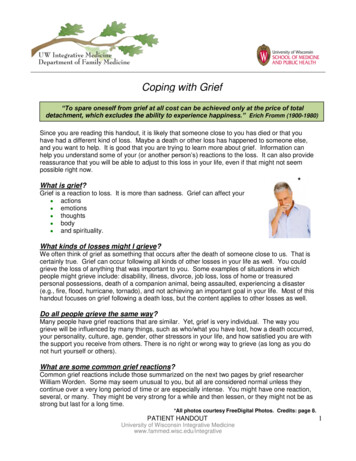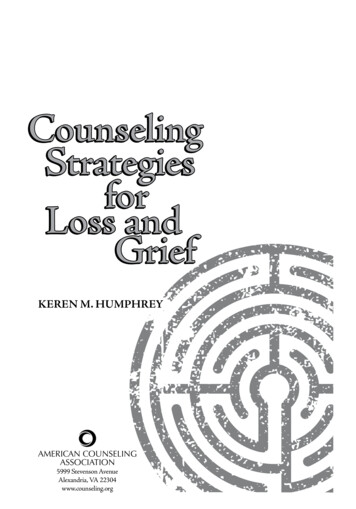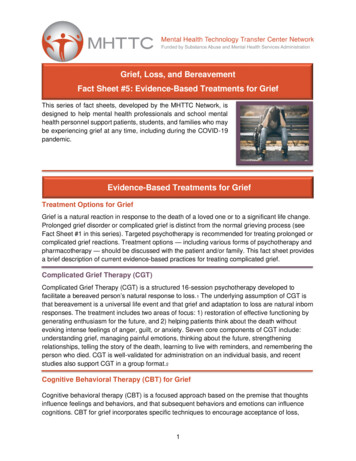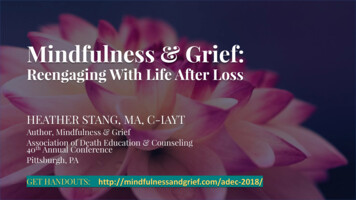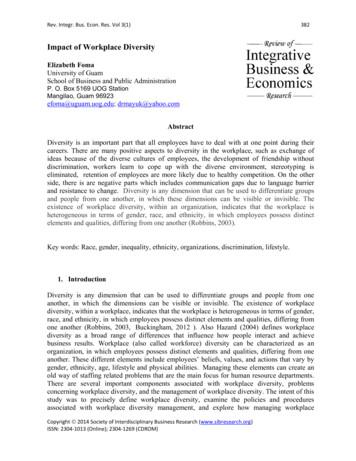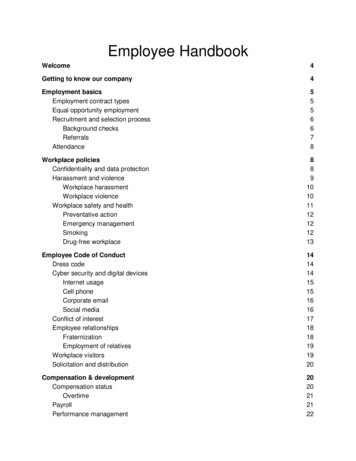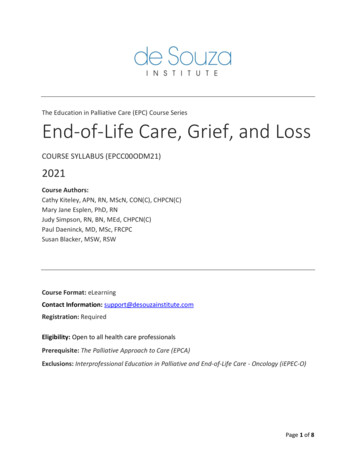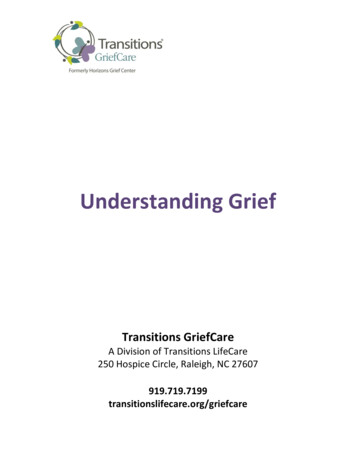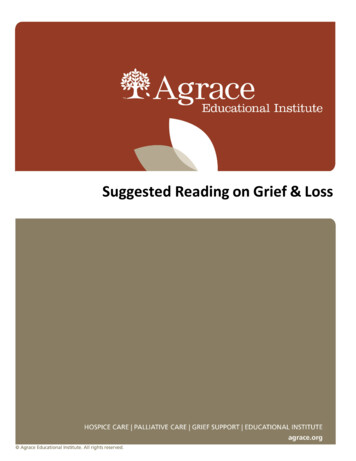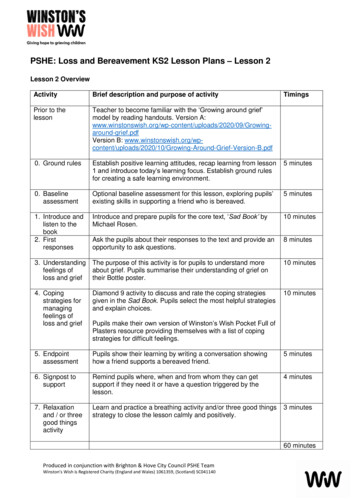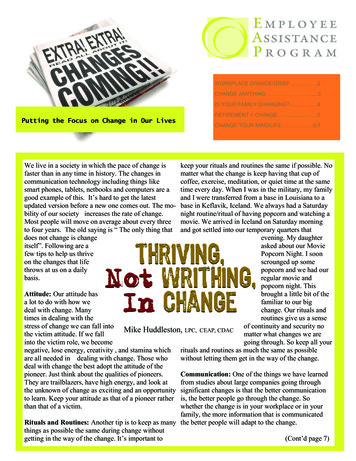
Transcription
WORKPLACE CHANGE/GRIEF .2CHANGE ANYTHING . . .3IS YOUR FAMILY CHANGING?. .4Putting the Focus on Change in Our LivesWe live in a society in which the pace of change isfaster than in any time in history. The changes incommunication technology including things likesmart phones, tablets, netbooks and computers are agood example of this. It’s hard to get the latestupdated version before a new one comes out. The mobility of our society increases the rate of change.Most people will move on average about every threeto four years. The old saying is ― The only thing thatdoes not change is changeitself‖. Following are afew tips to help us thriveon the changes that lifethrows at us on a dailybasis.RETIREMENT CHANGE . . .5CHANGE YOUR MIND/LIFE .6,7keep your rituals and routines the same if possible. Nomatter what the change is keep having that cup ofcoffee, exercise, meditation, or quiet time at the sametime every day. When I was in the military, my familyand I were transferred from a base in Louisiana to abase in Keflavik, Iceland. We always had a Saturdaynight routine/ritual of having popcorn and watching amovie. We arrived in Iceland on Saturday morningand got settled into our temporary quarters thatevening. My daughterasked about our MoviePopcorn Night. I soonscrounged up somepopcorn and we had ourregular movie andpopcorn night. ThisAttitude: Our attitude hasbrought a little bit of thea lot to do with how wefamiliar to our bigdeal with change. Manychange. Our rituals andtimes in dealing with theroutines give us a sensestress of change we can fall intoof continuity and security noMike Huddleston, LPC, CEAP, CDACthe victim attitude. If we fallmatter what changes we areinto the victim role, we becomegoing through. So keep all yournegative, lose energy, creativity , and stamina which rituals and routines as much the same as possibleare all needed in dealing with change. Those whowithout letting them get in the way of the change.deal with change the best adopt the attitude of thepioneer. Just think about the qualities of pioneers.Communication: One of the things we have learnedThey are trailblazers, have high energy, and look atfrom studies about large companies going throughthe unknown of change as exciting and an opportunity significant changes is that the better communicationto learn. Keep your attitude as that of a pioneer rather is, the better people go through the change. Sothan that of a victim.whether the change is in your workplace or in yourfamily, the more information that is communicatedRituals and Routines: Another tip is to keep as many the better people will adapt to the change.things as possible the same during change withoutgetting in the way of the change. It’s important to(Cont’d page 7)
2-Emily Durham, LPC, CEAP“The only constant is change, continuing change, inevitablechange ” Isaac Asimov. People experience significant changes intheir lives every day in relationships, jobs, finances, responsibilities,etc. Then why is change so often difficult and painful? Change isoften experienced as a kind of death. An end or loss of the waythings were - a death to a particular way of life - and grief is auniversal response to death. Grief is the experience of letting go, ofsaying farewell to something loved and familiar.Changes in our workplace, job, or profession present uniquechallenges to our ability to cope. Work provides to the individual a sense of identity, purpose, andstability. Drastic changes in this area of life often bring on a period of mourning as we make theinevitable transitions and accommodations necessary to survive and hopefully, to ultimately, thrive.This grief is experienced on many levels. Grief can affect us physically, causing such symptoms assleep and appetite disturbance, fatigue, and even actual illness. Grief can affect us cognitively altering our perspective, causing intrusive or obsessive thoughts, limiting our ability to concentrateand make good decisions. Primarily, grief affects our feelings. A whirlwind of intense emotions canthreaten to overwhelm us. Anger, fear, denial, guilt, despair, confusion, sorrow may all be part ofour grief process. Grieving is not a weakness - it is the process through which we must journey toheal from our losses and move forward in our lives.Grief is not a linear process and no two people grieve in exactly the same way. There is no right orwrong to this process and no particular time limit. What we can do is be proactive in our own healing- taking our next right step as we move through the process. (See “Next Right Steps on Page 7)There will be good days and bad days as we adjust to the changes in our work life. Eventually we willfind a new place of comfort and stability. We will find ourselves concentrating more on the worldaround us and less on our feelings of loss. We learn that we really are strong, we really can endureand that our lives, though changed, will go on.―All changes have their melancholy; for what weleave behind us is a part of ourselves; we must die toone life before we can enter another.‖Anatole France
3Margaret Morgan, LCSW, CEAP―Someday I want to .(fill in the blank).‖Have you said this as many times as I have? Probably.We are good at finding reasons that we aren’t doing itright now .focusing on obstacles.Maybe evenbelieving that we should ―feel like doing it‖ in order todo it.Part of the challenge of creating change in our lives isthat some of the things that would help us be successfulare boring, uncomfortable or even painful. Sometimes itseems easier to live with the negative consequences ofour current behavior rather than change.The VitalSmart group (Crucial Conversations) has a newbook and set of web tools available to help you movepast the ―someday‖. ―ChangeAnything.com is a socialnetwork that helps people change chronic behaviors forgood. Based on the ground-breaking principles in thebook, Change Anything: The New Science of PersonalSuccess, it guides people through their unique changechallenges in their personal and professional lives.‖Change Anything helps you to look in depth at sourcesof success or failure in change efforts. The authorscontend that having a view of a single thing being thecause of failed change efforts is very limiting and missesinformation that if understood, can help an individualmake meaningful and lasting changes. One big root offailed change is the belief that willpower will alone helpus meet our goals.―When people believe that their ability to make goodchoices stems from nothing more than their willpower—and that willpower is a quality they’re either born withor they’re not—they eventually stop trying altogether.The willpower trap keeps them in a depressing cycle thatbegins with heroic commitment to change, which isfollowed by eroding motivation and terminatedinevitably by relapse into old habits.‖―Then, when the built up pain of their bad habitsbecomes intolerable, they muster up anotherheroic but doomed attempt at change. We feel asif we were ascending a summit when in factwe’re simply walking a treadmill: lots of effort,no progress. That’s the willpower trap.‖The model is based on six sources of influenceon change efforts. Below is a summary of thosesix sources:Source 1: Love What You Hate-make the rightchoices pleasurableSource 2: Do What You Can’t-develop skillsthat will help you reach the desired changeSources 3 and 4: Turn Accomplices into Friends-look at the people in your life and have a crucialconversation about your goal and their roleSource 5: Invert the Economy-Bribe yourself tochange create incentives!Source 6: Control Your SpaceLook at how environmentaffects your change efforts.If you are interested in movingpast ―someday‖ and movingforward, this book is anexcellent resource. YourEmployee AssistanceProfessional can assist you inyour change efforts and be a powerful ally asyou create your personal motivation statementand go about these changes in a scientific way.
4-Glenda Davis, LPCWhile the image that comes to mind at the word―family‖ usually involves nurturing, warmth andstability, today’s reality about families is thatthey are far from stable. By its very nature,family composition changes. Two individualscome together and form a bond, bringing withthem all their diverse backgrounds, theiremotional baggage and even their eccentricrelatives. From that bond, often spring children,who then grow up and leave. At some point, thebond may be broken and the family split.Children may live with grandparents or otherrelatives. Other relatives may move into thehousehold. Adult children may return to livewith their parent(s). While mental healthprofessionals tell us that children need stability, itis very far from the norm for many - maybe most- families.As we age, we find new challenging changescoming our way. Retirement, becoming thecaretaker for our own parents, divorce after manyyears of marriage and health challenges are just afew. We must come to terms with our ownmortality and that of our loved ones.How can we deal with the inevitable changes inour family, for the sake of the children, our lovedones and for our own mental health? We gainour image of how a family should operate fromour own family of origin and other families wewere closely involved with. But suppose yourfamily begins to diverge from anything you haveknown before, what then?Be flexible. Don’t try to mold your family into amodel that no longer fits it.Example: Your own parents never divorced, but youfind yourself divorced, remarried and astep-parent. The way you learned to parent fromyour parents does not seem to be working in thissituation. Your parenting style will have to adapt.Be patient. If no one’s health or safety is at risk, youbenefit by doing nothing rash. Many problemswill work themselves out in time.Example: Blended families need time to become acohesive unit, otherwise they may become―blendered‖ families.Rather, think of thecombining of 2 families as a crock-pot dish whereyou put all the ingredients together, set the heatfor low and wait.Communicate. Don’t assume that other family members are on the same page. As families go throughtransitions, all family members should be openabout how those changes are affecting them andwhat the new norms will be. This is especiallyimportant in a 2 parent home as both parents needto be in agreement about how to deal with theeffects on the children.Get help. When you find yourself in unfamiliarfamily situations you need a navigational aid, justas if you are in a new territory and need a map.This may involve learning a new language – suchas the texting shorthand used by teenagers. Itmay involve reading books or articles written bythose who have knowledge about similarsituations. Or, it may involve finding a guidewho is knowledgeable about these changes.Your AEAP consultant can help with counseling,referrals, resource materials and support. Wedon’t just see individuals; we see families andcouples also. You don’t have to try to do this onyour own.
5Betsy Johnson, LCSWI’ve begun to think ahead to retirement, and sometimes I dream about how nice it will be to do whatever Iwant, whenever I want. However, I know myself too well - when I have unstructured time, I tend to lazeabout and daydream and end up feeling like I’ve wasted time. This led me to a little project – what do I needto do now to prepare for the future, and how do I really want to be spending my time when I’m ready to godown that road? There are some obvious things that come to mind – taking care of my health and myretirement account, for instance. But what about the day to day, the hours that work fills up for me now?I started talking with friends and co-workers who have recently retired did some reading, and started thinkingabout this time of change in a different way. As one author puts it: ―The magic and the curse of retirement isthat it is the same as your earlier life; it is all up to you. You can pursue whatever you wish. Just be carefulwhat you wish for.‖ (Roiter, 2008: Beyond Work: How Accomplished People Retire Successfully)Many people, like me, need some structure to their days, and turning off the time clock may require somemajor readjustment. Every activity becomes a choice to be made. How do you structure your leisure timenow? Are you spending all your time on the weekends running errands, taking care of the house, andwatching TV? If so, can you imagine doing that 24/7?As Bill Roiter also points out: ―Our choice of how we spend our energy and time is closely related to what weconsider meaningful.‖ What is important in your life now? Will it sustain you when the stress and pressureof work subside?What about your social life? For many of us, our work friends are the people we spend the most time with.When you retire, will you be taking that circle of friends with you?Think about how much of your identity is wrapped up in who you are as a worker. If you retire completely,you will lose that identity. You will no longer defined by what you do so much as by who you are. When weimmerse ourselves in our roles as worker, spouse, parent, or caregiver, however satisfying that is for us, wemay lose a sense of who we are and what our guiding passions are. On the other hand, if we find passion andmeaning in our work, maybe we will choose to continue some kind of work in a different way, at a slowerpace, or as a consultant or volunteer.(Cont’d on Page 8)Twenty years from now you will bemore disappointed by the thingsyou didn't do than by the ones youdid do. So throw off the bowlines.Sail away from the safe harbor.Catch the trade winds in your sails.Explore. Dream. Discover.— Mark Twain
6An elder Cherokee Native American was teaching hisgrandchildren about life. He said to them, "A fight isgoing on inside me.it is a terrible fight and it is between two wolves.One wolf represents fear, anger, envy, sorrow, regret, greed, arrogance, selfpity, guilt, resentment, inferiority, lies, false pride, superiority, and ego.Rebecca White,The other stands for joy, peace, love, hope, sharing, serenity, humility,kindness, benevolence, friendship, empathy, generosity, truth, compassion,and faith.LCSW, CEAPThis same fight is going on inside you, and inside every other person, too."They thought about it for a minute and then one child asked his grandfather,"Which wolf will win?"The old Cherokee simply replied."The one you feed."Itis possible that changing your mind mightjust help you feel better!Over the years, we develop many habits in our lives .somehelpful .some not so much. This can happen with our thinkingpatterns as well .some are helpful and some are not. If you findyourself feeling more negative in life, feeling more distressed oreven anxious or depressed, take a look at your thinking patterns.Thoughts play a big role in how we feel and how we behave.Thoughts don’t cause all problems; however, you can changesome dysfunctional moods and behaviors by changing some ofyour thoughts and assumptions. For example, if you are thinking,―This always happens to me .I’ll never figure it out and no onewill help me‖, how will you react to those thoughts? Will yougive up? Will you avoid asking for help? Will you feel alone,helpless or hopeless?Rebecca White,Look at the list of Unhelpful Thinking Styles (next page) and ask yourself if you fall intoany of these styles of thinking. Once you have identified unhelpful thinking patterns,you can begin to challenge them, change them or distance from them and begin to seeyour situation in a different light. So maybe now you are thinking, ―Sometimes thishappens when I try it .I’ll figure it out .I know who can help me‖. What is yourreaction to those thoughts? Will you keep trying? Will you ask for help? Will you keepfiguring things out?Your Employee Assistance Professional can assist you in this quest to Change Your Mindand very possibly, help you Change Your Life!LCSW,CEAP
7Thriving in Change (cont’d from page 1)Self Care: During change it is important totake care of ourselves physically andemotionally. Remember, with big changes inour lives, sometimes we have to let go of thefamiliar past and embrace the future. This willinvolve the grieving process. We will gothrough denial, anger, depression, maybe guilt,trying to bargain to prevent the change, andfinally acceptance. Let yourself go through thisprocess while practicing some of the other tipsin this article. Pay attention to your physicalhealth. Eat healthy and get aerobic exercise ifpossible. This will help deal with the stress ofchange. These are good things to make a partof your rituals and routines as mentionedearlier.Humor: Humor is good medicine for youduring change. Exposing yourself to laughterand humor causes some of the same chemicalchanges in the brain as regular aerobic exercisedoes. So, if you can’t exercise, expose yourselfto humor and laugh a lot. As you knowcomedians live a long time. Just think aboutGeorge Burns and Bob Hope. Keep a copy ofReaders Digest around and always read thesection entitled Humor the Best Medicine. Itwill do your body good.In summary, in order to thrive in change, adopta pioneer attitude, increase communication,maintain your rituals and routines, take care ofyourself emotionally and physically, andmaintain a sense of humor. If you find that inspite of your best efforts you are struggling,consider professional consultation to help younavigate those life changes!
8The Employee Assistance Program (EAP) is a benefit providedby your employer. Your employer contracts with EAP as aresult of a commitment to the well-being of valued employees.EAP provides counseling, information and referral(if indicated) for employees and their immediate familymembers. EAP’s are ideal for individuals and familiesexperiencing personal distress, or simply seeking to improvehealth and well-being.Affiliated with the University of Arkansasfor Medical Sciences Short term, solution focused counselingFreeConfidentialThe EAP has offices in Little Rock, Hot Springs,Ft. Smith, Fayetteville as well as affiliateproviders throughout the State of u/eapNext Right Steps (cont’d from Page 3)What you can do is be proactive in your own healing - taking your next right step as you move through the process: Surround yourself with supportive, positive people - constant negativity is a drain you cannot afford.Learn all you can about the changes you are experiencing and evaluate how these changes will actually impact you inyour day to day routines.Decide you will survive these circumstances and your own intense emotions. Find a peaceful place to "feel yourfeelings."Now or later find a place to talk about your experience. A trusted friend, a loving spouse or a supportive counselor canprovide a safe place to explore feelings. Telling your story is an essential part of healing.Take control of the small things that are within your power - recreating and reclaiming your place a little at a time.Continue to take good care of yourself physically - sufficient food, sleep and exercise will keep your body strong inthis difficult time.Continue to do your work - there is power and healing in the act of doing.Retirement Change (cont’d from Page 5)The consensus is this: if you want to have a good life after retirement, the best way to plan for that is to have a good lifeNOW. That is, your interests and hobbies, your social life, your travels, your fun-filled adventures, and your relaxingmoments are not going to magically fall into place the moment you walk out that office door for the last time. Thinkabout your life as it is right now. Are you stuck in a rut? Do you enjoy your leisure time? Do you have a circle of friendsoutside of work? Do you have a hobby or pastime that you look forward to? Think about the things you enjoyed when youwere young – sometimes this can give you a clue about new directions to pursue.One more thought. Are you running too much and not taking enough time to relax? Remember the original meaning ofSabbath: a day of rest. If you took a day off and did not let yourself get involved in home or work projects, what wouldthat day look like for you? Remember that you may have many of these days . . . sometime in your future. Would you liketo spend those days in meaningful and enjoyable pursuits? Activities that leave you tired and happy at the end of the day,not bored and dissatisfied?It’s your life and only you can know what makes you happy. Dream on, think about your future, and find a way to beginwalking toward those dreams. Why wait?
Change Anything helps you to look in depth at sources of success or failure in change efforts. The authors contend that having a view of a single thing being the cause of failed change efforts is very limiting and miss
